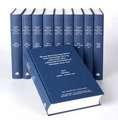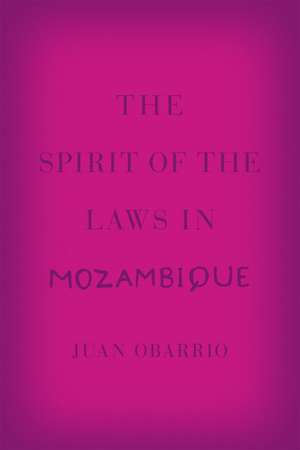The Spirit of the Laws in Mozambique: Emersion: Emergent Village resources for communities of faith
Autor Juan Obarrioen Limba Engleză Paperback – 10 noi 2014
Mozambique has been hailed as a success story by the international community, which has watched it evolve through a series of violent political upheavals: from colonialism, through socialism, to its current democracy. As Juan Obarrio shows, however, this view neglects a crucial element in Mozambique’s transition to the rule of law: the reestablishment of traditional chieftainship and customs entangled within a history of colonial violence and civil war. Drawing on extensive historical records and ethnographic fieldwork, he examines the role of customary law in Mozambique to ask a larger question: what is the place of law in the neoliberal era, in which the juridical and the economic are deeply intertwined in an ongoing state of structural adjustment?
Having made the transition from a people’s republic to democratic rule in the 1990s, Mozambique offers a fascinating case of postwar reconstruction, economic opening, and transitional justice, one in which the customary has played a central role. Obarrio shows how its sovereignty has met countless ambiguities within the entanglements of local community, nation-state, and international structures. The postcolonial nation-state emerges as a maze of entangled jurisdictions. Ultimately, he looks toward local rituals and relations as producing an emergent kind of citizenship in Africa, which he dubs “customary citizenship,” forming not a vestige of the past but a yet ill-defined political future.
Having made the transition from a people’s republic to democratic rule in the 1990s, Mozambique offers a fascinating case of postwar reconstruction, economic opening, and transitional justice, one in which the customary has played a central role. Obarrio shows how its sovereignty has met countless ambiguities within the entanglements of local community, nation-state, and international structures. The postcolonial nation-state emerges as a maze of entangled jurisdictions. Ultimately, he looks toward local rituals and relations as producing an emergent kind of citizenship in Africa, which he dubs “customary citizenship,” forming not a vestige of the past but a yet ill-defined political future.
Din seria Emersion: Emergent Village resources for communities of faith
-
 Preț: 144.99 lei
Preț: 144.99 lei -
 Preț: 94.22 lei
Preț: 94.22 lei -
 Preț: 133.99 lei
Preț: 133.99 lei -
 Preț: 146.50 lei
Preț: 146.50 lei -
 Preț: 126.25 lei
Preț: 126.25 lei -
 Preț: 179.93 lei
Preț: 179.93 lei -
 Preț: 307.53 lei
Preț: 307.53 lei -
 Preț: 138.81 lei
Preț: 138.81 lei -
 Preț: 208.31 lei
Preț: 208.31 lei - 18%
 Preț: 348.59 lei
Preț: 348.59 lei -
 Preț: 156.84 lei
Preț: 156.84 lei -
 Preț: 302.76 lei
Preț: 302.76 lei -
 Preț: 273.93 lei
Preț: 273.93 lei -
 Preț: 176.35 lei
Preț: 176.35 lei - 9%
 Preț: 352.77 lei
Preț: 352.77 lei -
 Preț: 548.71 lei
Preț: 548.71 lei -
 Preț: 310.21 lei
Preț: 310.21 lei - 8%
 Preț: 311.68 lei
Preț: 311.68 lei -
 Preț: 106.35 lei
Preț: 106.35 lei - 8%
 Preț: 360.28 lei
Preț: 360.28 lei -
 Preț: 209.69 lei
Preț: 209.69 lei -
 Preț: 176.35 lei
Preț: 176.35 lei - 6%
 Preț: 324.95 lei
Preț: 324.95 lei -
 Preț: 101.43 lei
Preț: 101.43 lei -
 Preț: 144.80 lei
Preț: 144.80 lei -
 Preț: 185.37 lei
Preț: 185.37 lei -
 Preț: 163.52 lei
Preț: 163.52 lei - 12%
 Preț: 251.95 lei
Preț: 251.95 lei -
 Preț: 182.98 lei
Preț: 182.98 lei - 18%
 Preț: 2261.34 lei
Preț: 2261.34 lei -
 Preț: 167.85 lei
Preț: 167.85 lei -
 Preț: 160.63 lei
Preț: 160.63 lei -
 Preț: 115.82 lei
Preț: 115.82 lei -
 Preț: 279.55 lei
Preț: 279.55 lei -
 Preț: 161.12 lei
Preț: 161.12 lei -
 Preț: 115.53 lei
Preț: 115.53 lei - 12%
 Preț: 290.56 lei
Preț: 290.56 lei -
 Preț: 183.89 lei
Preț: 183.89 lei - 17%
 Preț: 423.14 lei
Preț: 423.14 lei - 9%
 Preț: 352.50 lei
Preț: 352.50 lei -
 Preț: 147.26 lei
Preț: 147.26 lei - 8%
 Preț: 563.24 lei
Preț: 563.24 lei -
 Preț: 229.92 lei
Preț: 229.92 lei - 8%
 Preț: 346.31 lei
Preț: 346.31 lei -
 Preț: 216.08 lei
Preț: 216.08 lei -
 Preț: 215.51 lei
Preț: 215.51 lei - 9%
 Preț: 353.24 lei
Preț: 353.24 lei -
 Preț: 140.57 lei
Preț: 140.57 lei -
 Preț: 92.35 lei
Preț: 92.35 lei - 8%
 Preț: 564.99 lei
Preț: 564.99 lei
Preț: 162.97 lei
Preț vechi: 200.01 lei
-19% Nou
Puncte Express: 244
Preț estimativ în valută:
31.19€ • 32.48$ • 26.36£
31.19€ • 32.48$ • 26.36£
Carte indisponibilă temporar
Doresc să fiu notificat când acest titlu va fi disponibil:
Se trimite...
Preluare comenzi: 021 569.72.76
Specificații
ISBN-13: 9780226153865
ISBN-10: 022615386X
Pagini: 280
Dimensiuni: 152 x 229 x 18 mm
Greutate: 0.39 kg
Editura: University of Chicago Press
Colecția University of Chicago Press
Seria Emersion: Emergent Village resources for communities of faith
ISBN-10: 022615386X
Pagini: 280
Dimensiuni: 152 x 229 x 18 mm
Greutate: 0.39 kg
Editura: University of Chicago Press
Colecția University of Chicago Press
Seria Emersion: Emergent Village resources for communities of faith
Notă biografică
Juan Obarrio is assistant professor of anthropology at Johns Hopkins University.
Cuprins
Introduction: The Spirit of the Laws
Part I
Chapter 1. Mozambique: Before the Law
Chapter 2. Law as History
Chapter 3. The State of Things
Part II
Chapter 4. A Minor State
Chapter 5. Poetic Justice
Chapter 6. Next of Kin
Chapter 7. Subject: To the Law
Conclusion
Acknowledgments
Bibliography
Notes
Index
Part I
Chapter 1. Mozambique: Before the Law
Chapter 2. Law as History
Chapter 3. The State of Things
Part II
Chapter 4. A Minor State
Chapter 5. Poetic Justice
Chapter 6. Next of Kin
Chapter 7. Subject: To the Law
Conclusion
Acknowledgments
Bibliography
Notes
Index
Recenzii
“A lucid investigation of conflicting juridical traditions in Mozambique. Deploying his expertise as an anthropologist, Obarrio describes fieldwork findings in northern rural areas of the country, focusing on how the ‘customary’ has endured and been transformed despite eclectic institutionalization. . . . The book penetratingly interprets conflicting and coexisting legal traditions at the local level, especially in terms of the push-pull between socialist visions of a centralized state and more recent liberal-democratic trends seeking respect of customary diversity.”
“In Juan Obarrio’s analyses of the law in the Mozambican postcolony, the law invents sentences that it cannot finish, and it reserves for itself the possibility of ellipsis and incompletion while it offers itself as that which is able to tie things up— all of the loose ends, all of the bits and pieces of deliberation, negotiations within a coherent state of things. It creates a state of its own impossibility through which it is able to ‘recede into society’—reach into the variegated details of everyday differences and ‘turn them around,’ or, at least, turn them toward a consideration of themselves in the presence of something that exceeds them, even if this is largely absent, or impossible. . . . Obarrio’s detailed examination of the restructuring of Mozambican society through the technology of the law is an invaluable tool to think about the generalization of expendability and the increasingly arbitrary character of life trajectories. This is technology that sutures disjunctive times, invents space for the operation of a state increasingly groundless in its own convictions and choreographed by transnational interventions, yet able to recuperate the form of past subjections, that it once existed to undo, as a means of instantiating itself across contested jurisdictions.”
“What Juan Obarrio does he does beautifully and provocatively: to provide a rich, detailed, and variegated ethnographic account of the templates by which the socio-legal, political, and juridical frameworks of the African nation-state have been and are being forged in the full face of the contradictory constituencies within which laws are articulated. The book will come to be seen as an abiding classic in this respect.”
"A timely contribution to the debate on the dynamics of the state in Africa and legal reform in Mozambique. Furthermore, it will provide a useful counterpoint for the much-needed reframing of old debates on legal pluralism and access to justice."
